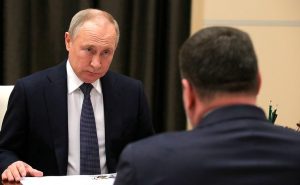Independent Russia has yet to come up with a way of transferring power other than war
By Dmytro Babachanakh Published 5-4-2022 by openDemocracy
Much has been written about Russia’s war against Ukraine and yet for many, one fundamental question remains unanswered: why did Vladimir Putin decide to launch a full-scale invasion in the first place?
When the Kremlin annexed Ukraine’s Crimea peninsula and occupied the Ukrainian Donbas region in 2014, the explanation for its actions seemed straightforward. In response to Ukraine’s revolution that removed a pro-Russian president, Russia had sought to gain complete control of Crimea and turn it into a military base, weakening Ukraine and stalling the country’s integration with NATO and the EU.
Arguably, Putin managed to achieve these goals before the full-scale invasion in 2022, but he then decided to go further, which calls for a reevaluation of the Kremlin’s actions.
The Putin regime is a matured autocracy that controls all domestic processes. Why destabilise a well-oiled system that has allowed the Kremlin to enrich its core constituents and hamper potential protests?
The invasion of Ukraine could be a ‘war of legacy’, which was meant to ensure the transfer of power to Putin’s successor. Rather than a destabilising action, the war was seen by the Kremlin as a means of cementing the elite’s gains made over the past 20 years.
That the issue of transition is crucial for the Kremlin is clear. Putin, now 69, has a penchant for history, and understands that the transfer of power is one of the largest potential weaknesses of autocratic states. Furthermore, since Putin became president, no real transfer of power has taken place, as he has relied on dubious manipulations, such as the 2011 Putin-Medvedev ‘castling’ and changes to the Russian constitution, to prolong his time in office.
In fact, the only real transition of power in independent Russia, when Putin took over from Boris Yeltsin in 1999-2000, was enabled by war. After Putin became acting president on Yeltsin’s resignation, the sole reason for the increase in his popularity was the government’s handling of the Second Chechen War. At the time, Putin’s approval rating was catastrophically low, but he was repositioned as the ‘defender of Russia’, allowing him to secure victory in the 2000 election.
There is some evidence that the pretext for the Second Chechen War – the bombing of apartments in several cities across Russia – was engineered by the FSB, the successor of KGB, which was led by Putin shortly before he took office. In any case, there’s a familiar pattern: come up with a pretext for a conflict that the Kremlin believes is winnable, get a ‘small victorious war’ that can be broadcasted to the domestic audience and reap the political benefits.
To understand how Russia was planning to utilise the current war, one has to consider an ideal scenario for Russia. The war was perceived as an easy win: Russia planned to occupy the majority of Ukraine in three days, capture Kyiv, and install a puppet government. On top of that, Russian forces could continue the occupation of Belarus.
This would have led to complete Russian dominance in the region. Russia would be in a position to redesign the security landscape of Europe and gain nearly full control over key former Soviet republics. This would mean the Kremlin’s so-called ‘spheres of influence’ would be realised without any real risk of challenge.
A Russian victory in Ukraine would also make the legitimation of Putin’s successor in office easier, giving the regime an ideological backbone, which it has lacked. For years, the Kremlin has emphasised its victory in the Second World War, the importance of strong leadership, and Putin’s irreplaceability. A Russian victory would allow it to reconcile these disparate themes and contribute to what infamous presidential adviser Vladislav Surkov called “the long state of Putin”.
This outcome would also consolidate popular support for the Kremlin’s actions and eliminate the competition between the different elite parties through a uniting agenda. These preconditions would enable the successful transfer of power. Failing that, Putin’s departure would create a vacuum where ideas, interests and state strategies could become uncontrollable. War, on the other hand, provides an opportunity for the state apparatus to have direct control over the flow of ideas, the economy and the political processes of the state.
Another way to think about the transition of power in Russia is to consider the spending priorities of the Russian state prior to the war. Putin’s regime has been unable to raise the living standards of Russians, with the corrupt nature of the Russian economy making liberalisation unlikely, even before the costs of invasion were incurred. On the other hand, military spending has increased over several years, making it a perfect candidate to facilitate the transition of power in Russia. A victory would award the Kremlin and Putin’s chosen successor popular support all while avoiding excessive spending on welfare.
War – and a perceived sense of victory – would enable the Kremlin to create preconditions that would ensure the continuity of the Russian state after Putin both among ordinary Russians and the elites.
Instead, Russia has found itself in unfamiliar territory and facing a more complex future power transition. If the Kremlin believed that transition would be difficult for a country with a status quo, it will soon learn that it is far more difficult for a country that cannot win a war.
This article is published under a Creative Commons Attribution-NonCommercial 4.0 International licence.


